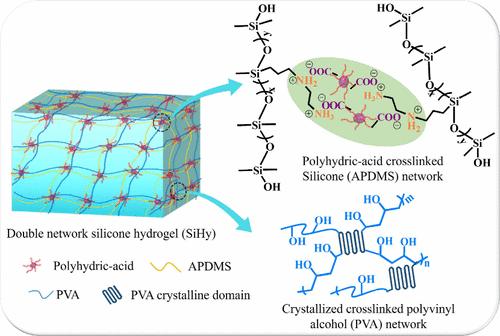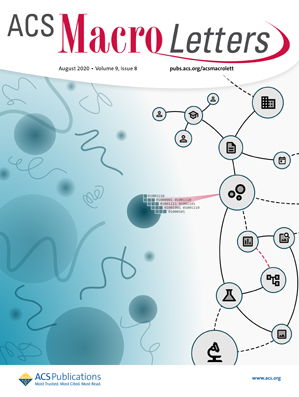One-Step Soaking Approach for the Development of High-Strength, Tough Silicone Hydrogels with Elevated Polysiloxane Content
IF 5.1
Q1 POLYMER SCIENCE
引用次数: 0
Abstract
Silicone hydrogels (SiHys) present a variety of promising applications. However, their intrinsic mechanical limitations and low silicone content often restrict their practical use. In this study, we propose a simple and versatile one-step soaking strategy to produce double-network SiHys with high silicone content and enhanced mechanical strength and toughness. Hydrophobic amino-modified polydimethylsiloxane (APDMS) becomes hydrophilic through a “salt-forming” reaction with acetic acid (HAc), enabling substantial incorporation within a poly(vinyl alcohol) (PVA) network. This is followed by a one-step soaking in a polyhydric-acid salt aqueous solution, facilitating the in situ formation of a physically cross-linked APDMS network via acid exchange. By controlling the feed concentration of APDMS and the types of polyhydric-acid salts employed, we can fine-tune the hydrogel’s aggregated structural characteristics and the strength of intermolecular electrostatic interactions, thereby enabling a wide range of tunability in the mechanical properties of the SiHys. This study innovatively establishes a simple and universal technique for preparing silicon-based hydrogels with high mechanical performance and silicone content, advancing the development of silicon-based hydrogels.

求助全文
约1分钟内获得全文
求助全文
来源期刊
CiteScore
10.40
自引率
3.40%
发文量
209
审稿时长
1 months
期刊介绍:
ACS Macro Letters publishes research in all areas of contemporary soft matter science in which macromolecules play a key role, including nanotechnology, self-assembly, supramolecular chemistry, biomaterials, energy generation and storage, and renewable/sustainable materials. Submissions to ACS Macro Letters should justify clearly the rapid disclosure of the key elements of the study. The scope of the journal includes high-impact research of broad interest in all areas of polymer science and engineering, including cross-disciplinary research that interfaces with polymer science.
With the launch of ACS Macro Letters, all Communications that were formerly published in Macromolecules and Biomacromolecules will be published as Letters in ACS Macro Letters.

 求助内容:
求助内容: 应助结果提醒方式:
应助结果提醒方式:


